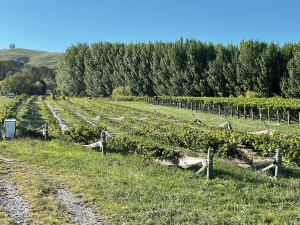Conversations on the morning of the Hawke’s Bay edition of Grape Days 2023 were about the heavy rain watch in place for Auckland and its potential threat to the Football Ferns’ opening game against Norway.
This weather watch resonated with many attendees, just five months on from the devastation of Cyclone Gabrielle in Te Tai Rāwhiti / Gisborne and Te Matau-a-Māui / Hawke’s Bay: distant enough to fill an entire session on cyclone recovery but close enough for weather warnings to trigger a twitch of anxiety.
Anyone who watched Bruce Nimon choke up at the beginning of his talk will know that recovering from the destruction is still a daily fight, despite much of the region returning to relative normalcy. Bruce’s segment covered Kokako Farms’ ongoing efforts after completely losing 15 hectares of vineyard and having 30 out of 100ha under two metres of water. “I’m gonna lose my shit … I’m finding this quite hard,” Bruce began. His talk aptly illustrated the two sides of the disaster: the pragmatic (Kokako burned the bearings out on their net winder after just one row of silt-sodden vineyard) and the personal (“this has knocked me pretty hard”).
The same duality was apparent in his lessons learned, with the first being “take more holidays”. Other observations included sub-surface irrigation being a “saviour”; that local streams could be just as damaging as big rivers; and “recovery beats replant”. Insurance was the biggest lesson of all, because the data requirements to support claims were “massive”.
Indeed, there was ample scope to learn from Cyclone Gabrielle in a way that perhaps had not been done for the previously most destructive (and similar) weather event, Cyclone Bola. This was the background to consultant viticulturist Emma Taylor’s opening cyclone recovery talk. “I was surprised by how much we didn’t have written down from Bola,” she said. “Since Cyclone Gabrielle, all I do is talk about the weather,” she admitted. “In a period of climate change, we know that cyclones will happen, as will droughts.”
Numerous were the lessons: every vineyard was different; information needed to be disseminated fast; grapevines are hardier than we think; silt is someone’s topsoil; phylloxera dies in floods; plant vine rows parallel to rivers; silt naturally breaks open to the air through drying and worm activity.
Silt was the major factor for Indevin’s Paul Robinson, speaking of the Twin Rivers site at Pākōwhai – one of the hardest-hit areas in Hawke’s Bay. Parts of the vineyard were under water for a week, with access only properly returning after six to eight weeks. “We pretty much locked the gates … it was pretty tough to walk away from over 500 tonnes.”
Fortunately, he admitted things were not as bad as initially suspected. Dealing with the silt proved to be key, and the majority of the focus at the site has been to break it up and, effectively, turn it into topsoil.
While dealing with the damage remains a current and ongoing concern for many, it was clear that the community had played a huge role in helping to weather the effects of the cyclone. Furthermore, as many pointed out, that community spirit went beyond Hawke’s Bay and Gisborne to people both nationally and internationally volunteering help in myriad ways.
The final talk of the session was by local psychologist Wanda Douglas, who was engaged by both Hawke’s Bay Winegrowers and Hawke’s Bay Fruitgrowers’ Associations to provide psychological support to affected members and their families. Although pointing out that humans were “hard-wired to cope in adversity”, Wanda emphasised that resilience was an attribute that needed focus. “Highly resilient people have good networks,” she said. And looking out for others was important. “If you are worried about someone else, start a conversation.”














